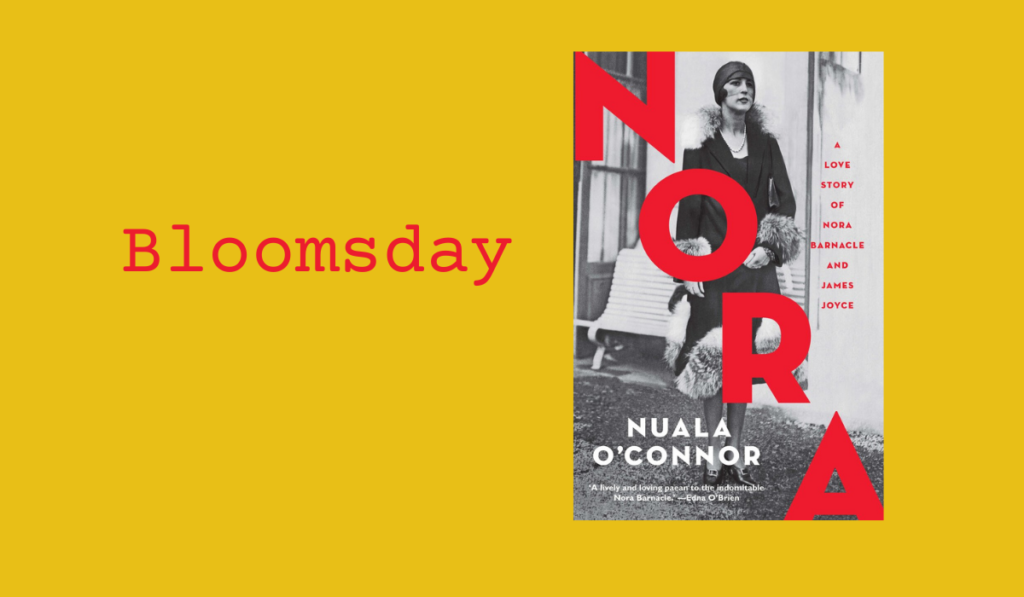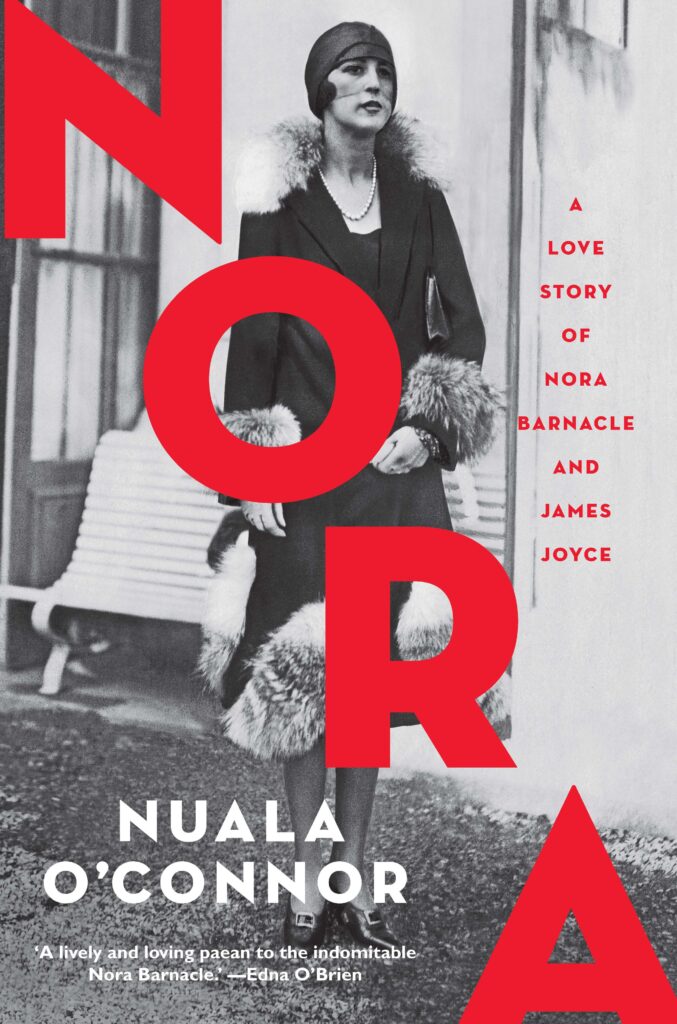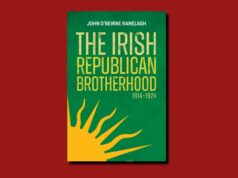
Nuala O’Connor on the magnificent Nora Barnacle Joyce
by Nuala O’Connor
Poor and uneducated people can be magnificent, a fact which some find hard to swallow. These individuals are often magnificent—not because they strive for honours or wealth or large achievements—but just by being quietly and resolutely their own person.
Nora Barnacle, wife of James Joyce, had scant finances and little schooling and, because of the Ireland she was born into, probably no huge ambitions. She was an intelligent woman, who was also kind, supportive, grounded, good-humoured, and generous and, by being all of those things, she was the right companion for a literary genius who often found ordinary life – and other people – tricky.
European life
Galway-born Nora sauntered into Joyce’s world in June 1904 and, with her patience and pragmatism, supported him in their peripatetic life in Europe. In her book on Joyce, Vivien Igoe writes that Nora’s decision to leave Galway – after a beating from her uncle – was the start of ‘the nomadic peregrinations of this extraordinary girl from Galway’. Nora would spend thirty-seven years wandering with Joyce, who was drawn to this earthy, twenty-year-old first by her looks, then by her name – he revered Ibsen and his Nora, and, no doubt, Joyce also loved the singularity of ‘Barnacle’. He soon learned that Nora’s humour and vocabulary, her stories and her way of telling them, could be put to good literary use.
Cash-poor and uneducated Nora may have been, but she was extraordinary, and it did not occur to her that she wasn’t – she was a woman in possession of herself and she left Galway with both life and work experience.
Independence
Having been raised by her grandmother, Nora had a certain independence, and she had known love, too, having had serious boyfriends in Galway. Once in Dublin, Nora easily landed a job in Finn’s Hotel, and met Joyce, a young man grieving his recently dead mother, who was no longer a college student, and had neither job, nor career prospects. Joyce, that June, wandered penniless from friend to friend, cadging digs; Nora, with both wages and accommodation, was more secure.
Joyce was concocting a plan to go abroad – he craved escape from what he perceived as the lack of naturalness and honesty he found in Irish people. He fell for natural and honest Nora and they formed a solid union that lasted until Joyce’s death in Switzerland in 1941. Fintan O’Toole believes Nora liberated Joyce from shame and snobbery; she certainly uplifted him by being strongminded, flexible, loyal, and direct.
When I decided to write a biographical novel about Nora, I knew it was important to remain true to who she and Jim were as people, rather than invent ultra-palatable versions of them.
It’s not the novelist’s business to write genial characters, but to confront human foibles and frailties, even if it makes their players ‘unlikeable’. Interestingly, Anne Enright observed, ‘…fictional men are allowed to be bad, their badness often is the story, female characters are not allowed to be bad, because it makes a story slightly unpleasant.’
Writing Nora
Nora, for all her solid magnificence, had her idiosyncrasies, which included a certain blindness to Joyce’s failings at times. He fell in and out of financial messes and Nora was, like him, prone to spending when money was scarce. She also put up with the endless moving the family endured though, truly, she had little choice: she put herself in a certain position by running away, unmarried, with Joyce. Nora came over as lazy to some of her ex-pat counterparts – they didn’t understand why she was not, in essence, Joyce’s secretary; in reality, she was his anchor and rock, physically and emotionally. Another criticism levelled at Nora has been that, as a mother, she preferred benign neglect above any other style of parenting. Though the family’s love for each other was solid, and the Joyces kept close company with their children, they didn’t prepare Giorgio and Lucia well for life or careers.
As for Joyce, he could be difficult to live with – he was a habitual drinker, and he often put his writing first.
Brenda Maddox, in her biography of Nora, says Joyce’s monomania about writing ‘destroyed many of his friendships and, as far as one can judge, his children.’ Joyce had a reputation as a sponger, though he was also generous with money when he had it. Sometimes Joyce created deliberate disorder so that he had new things to write about; he indulged in fervent fancies for other women, for example, writing to them and arranging meetings, and he encouraged Nora to go with other men, though she refused to.
Inner Life
Bio-fiction aims for the revealing of an emotional life and, in NORA, the reconstruction of what it must have felt like to raise a family with Joyce, when finances and the future were precarious.
Nora’s life with her beloved Jim was exciting at times, but it was also hard, and the novel examines how she coped. It also illustrates how Joyce would have been stymied without Nora’s loving, steady presence, and the ways they balanced their strengths and failings. But the novel is Nora’s story, Nora’s viewpoint, Nora’s world, and it retains this single consciousness. To paraphrase Colm Tóibín, writing about his work on re-animating Henry James, Nora’s not a fictional character, she’s already there, so I had much to work and play with.
As regards plot, in bio-fiction, the life is the plot.
Hilary Mantel says the novelist ‘lives inside the consciousness of her characters for whom the future is blank.’ So the reader witnesses, in real-time, the dramas of Nora’s life with Jim, with Lucia’s mental health, and with Giorgio’s life choices as an adult, and all their roaming from home to home, and country to country. The Joyces’ on-the-move, hand-to-mouth existence is one of the central aspects of their lives – Nora followed Joyce wherever he went, though she was often a little grumpy doing it, much as she liked novelty.
Edna O’Brien concluded that writers ‘are a scourge to those they cohabit with’ and this was true for the Joyces, but they enjoyed a deep love, too. Joyce wrote to Nora: ‘No human being has ever stood so close to my soul as you stand.’ When her darling Jim was being lowered into his grave, Nora called out, ‘Jim, how beautiful you are!’ as she caught her last glimpse of him through the coffin’s vitrine.
The joy of writing bio-fiction is giving the central protagonist an interiority and a day-to-day existence that is mostly uncharted outside the facts of their lives.
We know that Nora was charismatic, that she buoyed Joyce up, and that she was the inspiration for many of his female characters, including Molly Bloom in Ulysses. But by centralising Nora, I had the chance to get inside her skin, travel with her, and imagine how she felt about life, to see what she longed for, for herself and her family, and about the things that tried her, and those that pleased her. And Nora Barnacle, who was a little pious, a little vulgar, and resolutely, unapologetically herself, proved to be a magnificent companion on that journey.

Nuala O’Connor‘s novel, Nora (New Island Books), about the life of Nora Barnacle, is out now.












